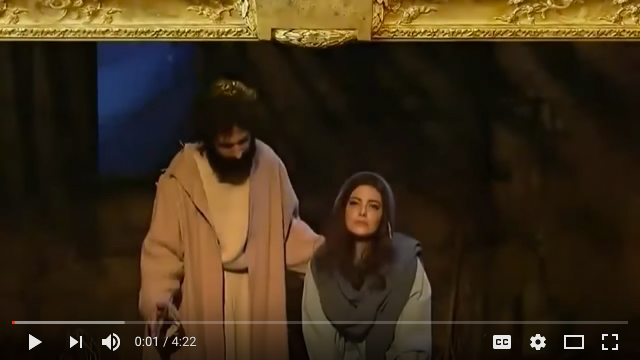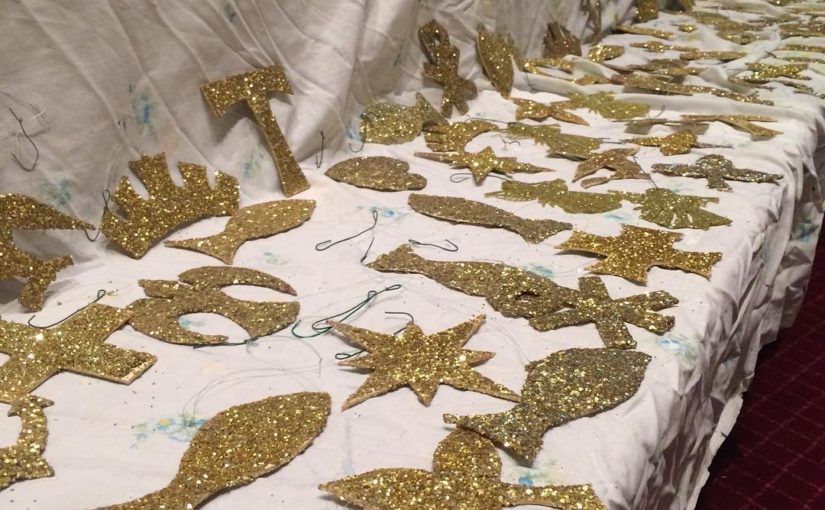When John heard in prison what the Messiah was doing, he sent word by his disciples and said to him, “Are you the one who is to come, or are we to wait for another?” Jesus answered them, “Go and tell John what you hear and see: the blind receive their sight, the lame walk, the lepers are cleansed, the deaf hear, the dead are raised, and the poor have good news brought to them. And blessed is anyone who takes no offense at me.”
As they went away, Jesus began to speak to the crowds about John: “What did you go out into the wilderness to look at? A reed shaken by the wind? What then did you go out to see? Someone dressed in soft robes? Look, those who wear soft robes are in royal palaces. What then did you go out to see? A prophet? Yes, I tell you, and more than a prophet. This is the one about whom it is written, ‘See, I am sending my messenger ahead of you, who will prepare your way before you.’ Truly I tell you, among those born of women no one has arisen greater than John the Baptist; yet the least in the kingdom of heaven is greater than he.
Matthew 11:2-11
My sermon from 3rd Sunday of Advent (December 11, 2016) on Matthew 11:2-11.
****
In my house, I have this big wooden chest full of just…stuff. Inside it are records, used cds, a few books that are personally meaningful to me, and a smaller box full of random things – like senior pictures of my friends from high school and the setlist I pulled off the stage when I saw one of my favorite bands play. And on top of this smaller box rests something that’s important to me: and that’s my ticket stub collection. Inside 3 small binders are plastic sleeves stuffed with old tickets where the ink is barely readable. Each one represents an incredible series of memories: from my first arena rock show to the time my camera was smashed during a poorly thought out step straight into a moshpit. When I flip through my collection of ticket stubs, I’m reminded of everything I’ve seen; everything I’ve heard; and it makes me want to share those memories all over again. I end up bugging the people around me with stories like that time I sat on the floor of the Park Avenue Armory watching giant pieces of fabric fly over me, or when the lead guitarist of Kill Hannah accidentally kicked me in the face at the Limelight, or what it was like to visit CBGB’s for the first time. I feel compelled to narrate what I saw, paint a picture of what I experienced, and let the people around me know just how amazing, strange, terrible, or awesome this…show was. And after I tell my story, I usually end with something along the lines of “you should have just been there.” And in today’s text from Matthew, that’s basically how Jesus answers John. John wants clarification about who Jesus is. Is Jesus the one he’s been waiting for? And instead of just saying yes, Jesus tells him to look around, to listen, see what the Jesus experience is all about – and then he’ll know.
Today’s story needs a little unpacking because it’s a bit out of place. We’re spending a short time, just two weeks, digging into parts of John the Baptist’s story. Last week, we saw John call a bunch of people names prior to baptizing them in the river Jordan. Today we’re still with John but we’re 8 chapters away. In the stories we don’t hear, John has already met Jesus and Jesus was baptized. As Jesus felt the water cover him, John and others heard a voice from heaven declare Jesus as God’s beloved child. Jesus, after his baptism, heads into the desert to be tempted by the devil while John continues his preaching, teaching, and baptizing. But the ruling authorities around John have different ideas. John’s arrested, thrown in prison, and Jesus, once he gets word of what happens to John, decides this is the time to begin his public ministry. According to Matthew, John’s arrest is the catalyst for Jesus’ work. The ruling authorities tried to silence what God is doing in the world – but God had other plans.
So with John in prison, Jesus does…what Jesus does. He calls disciples. He heals the sick. He tells the poor that God is on their side. The world as God wants it to be is being expressed through what Jesus does. As his ministry grows and word about him spreads, John sits in prison…and he’s changed. The firey passion that defined his preaching in the wilderness is tempered. His confidence seems lower. And even though he was there when Jesus was baptized…John still needs to ask if Jesus is the one. Those in authority were hoping to silence John’s voice. They want him to stop speaking. And it…almost works because John doesn’t declare anything in today’s story. Instead, he just asks.
And Jesus answers in a peculiar way. He doesn’t just say “Yes”. He also doesn’t remind John that John was there when Jesus was baptized so John should already get this. Jesus, instead, invites John’s messengers to report back what they see and what they hear. That phrase – that invitation – is also an invitation for us to not read through this text too quickly. If we read through too fast, we miss what Jesus’ invitation requires the messengers to do. If these messengers from John are going to report back what they see and hear – they need to take time to actually see and hear. They’re not invited to just share what Jesus said; they’re called to embed themselves in what Jesus is doing. John’s messengers need to meet the blind, meet the lame, meet the leapers, see the deaf, notice the dead, and form relationships with the poor to get what Jesus is doing. Jesus isn’t just doing miracles. He’s connecting with the marginalized, with the people society pushes to the outskirts, meeting those who don’t not just feel like outsiders but who truly are. Jesus is getting to know those who need healing, connection, and belonging – and he invites John’s messengers to do the same. John’s messengers, if they’re going to get Jesus, need to know who the blind are, who the lame are, who the poor are – and discover what good news actually looks like. John’s messengers are invited to do more than just answer John’s question. They’re invited to see how Jesus is making a difference right now.
But this difference isn’t a difference only for John’s messengers. The text doesn’t tell us if John’s messengers were blind or lame or if any of them are poor. But I think the text wants us to assume that they are not. Jesus doesn’t tell John’s messengers to share how he’s made a difference to them. Jesus tells them to look around and see the difference he’s making in other people. Sometimes the most powerful thing we can do is share how God has made a difference in our lives. But…that kind of testimony is something we can’t always give. In a moment of sorrow or loss or stress or complete busyness – we can lose our words, we can misplace our testimony, and we can wonder if we’ve ever met Jesus and question if he’s here right now. And it’s in this moment of wonder when Jesus’ words to John become Jesus’ words to us. When we can’t see Jesus in our lives, Jesus invites us to make our lives bigger and our relationships different. He tells us to form new relationships with people who aren’t like us. Because when we’re in relationship with the blind, the lame, the pushed-a-side of our world, Jesus promises that he is right there. When our testimony about Jesus is not enough, let’s change things up by giving testimony about how we’re seeing Jesus acting in and through the people around us. When a mom who escaped an abusive husband with only the clothes on her back is able to give her kid the new bike he wanted for Christmas, healing begins. When a student receives new school supplies and food to eat during the weekend, she receives an opportunity to become something new. When a recently unemployed father visits a food pantry for the very first time, the food he brings home lets him see a better future. And when a new immigrant or refugee enters their new home and finds a community of people with furniture, clothes, and invitations to connect them to their new homeland, their fear is changed into new life. What God is doing in the world isn’t limited to only our story. When the ticket stubs of our life of faith seem worn out, old, and no longer bring memories worthy to share, there are still new tickets we can find where we are not the focus of the main act. Through relationships, new and old, with people who are like us and people who are not, we are called to see Jesus in the care, in the mercy, in the sacrifices we make for our family, our friends, our neighbors, and complete strangers. Because Jesus’ story isn’t only a story about what happened 2000 years ago when he was born in a barn. And his story isn’t about some unknown future that might be coming 2000 years from now. Jesus is making a difference right now. We only have to open our eyes – open our ears – see – and hear.
Amen.
Podcast: Play in new window | Download


